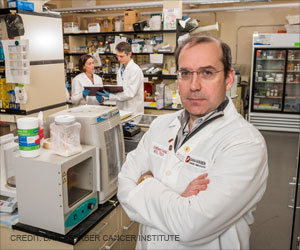Gene variations have been identified by a research team from the Institute of Cancer Research that are found to increase risk for testicular cancer by 10 fold.
- Testicular cancer affects men in their primes, in their 20s and 30s, leading to poor quality of life led by the patient.
- A research team from The Institute of Cancer Research has identified 19 new genetic polymorphismsthat increase risk for testicular cancer by 10 fold
- The findings of the study can be used to improve treatment and provide better care for such patients
Benefit of Genetic Testing
The newly identified genetic markers along with previously identified genetic markers- 44 in total- could be used to- Identify 1% of men who are at a higher risk for testicular cancer.
- 7 % of these men had a lifetime risk of being affected by testicular cancer, which is 14 times higher than the risk of 0.5 % present in the general male population.
Testicular Cancer
Testicular cancer is one of the common cancers among men, mostly occurring between 15 and 49 years. It is usually identified on detection of a painless lump which occurs in one or both the testicles. The lump could be as small as a pea or much larger. Some people also complain of a dull pain that occurs in the scrotum or a heavy sensation.This type of cancer is normally identified among men who are in their twenties or in their thirties and treatment involves platinum chemotherapy which can result in long term side effects and affect the quality of life led by the patient.
The research team analyzed the DNA samples of 7,319 men who suffered from testicular cancer and compared the data with that of 23,082 who did not have the disease.
The findings of the study showed that
- A change in a single letter in the DNA was associated with an increased risk of testicular cancer
- This gene polymorphism can be used to identify one-third of men who are at a higher risk of testicular cancer
- This study identified a genetic association with testicular cancer, which takes the total genetic factor to 44
Identifying the Mechanism
The research team analyzed the processes inside the cell that were initiated by the newly discovered genetic polymorphism. The scientists found that the gene polymorphism interfered with the regulation of gene activity inside the cell. The regulatory genes or the genes that ae found to interact with oncogenes KIT, are the ones that are affected in this type of cancer. Dr. Clare Turnbull, who is the lead author of the study and a senior researcher in the Institute of Cancer Research’s Genetics and Epidemiology, said that the study nearly doubled the number of gene polymorphisms that are associated with the risk for testicular cancer. The researcher further stated that there were still more gene polymorphisms that could influence the risk of the disease condition that need to be identified, requiring more follow up studies. All these gene polymorphisms interact over a period of time and affect the regulatory mechanisms within a cell, resulting in testicular cancer.The Chief Executive of The Institute of Cancer Research, Dr. Professor Paul Workman, said that comprehensive genetic studies are an essential aspect of identifying a reliable defense against cancer. A greater understanding of the mechanisms that trigger the condition will help in identifying effective therapeutic strategies. Apart from identifying men who are at a higher risk of developing the disease, the study also provides insights into the biology of the disease, and the mechanisms that lead to the development of the condition.
Possible End to Platinum Chemotherapy
Platinum chemotherapy is widely used to treat patients with testicular cancer, whereby platinum based anti-neoplastic drugs are used. Nearly 50% of cancer patients are treated using these drugs. A study conducted by Oh JH and colleagues titled “Long-term complications of platinum-based chemotherapy in testicular cancer survivors” and published in the journal Medical Oncology showed that platinum chemotherapy has considerable side effects when used for a prolonged period of time. This study showed that platinum-based chemotherapy increased the risk of coronary artery disease hyperlipidemia and hypertensionDirector of Programmes at the Movember Foundation, (a leading organization that focuses on men’s health), Paul Villanti, said that the pathways that are identified in the current study could be used to treat patients with an alternative to platinum chemotherapy. As men in their twenties and thirties are at a higher risk of this type of cancer, with their health getting affecting when they are in their primes, this study promises benefits and a better quality of life.
- Long-term complications of platinum-based chemotherapy in testicular cancer survivors - (https://www.ncbi.nlm.nih.gov/pubmed/17848741)
- The "Accidental" Cure—Platinum-based Treatment for Cancer: The Discovery of Cisplatin - (https://www.cancer.gov/research/progress/discovery/cisplatin)
Source-Medindia
















